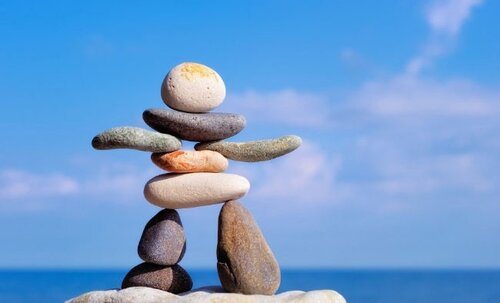
January 2022
This month's voice:
Sydney Lee, "Finding Balance"
Introduction
Lindsay Herron
Editor, KOTESOL Voices
The past couple of years have been challenging for everyone; and as 2022 rolls around, I suspect many of us are taking stock of the past as we contemplate the future. Are you feeling satisfied or depressed about what you've achieved (or haven't achieved) recently? Are you cautiously optimistic or feeling existential dread about the coming year? Maybe a mixture? There are many stressors (both new and old) that everyone is wrestling with right now; and I, for one, was comforted by Sydney Lee's contribution to this month's issue of KOTESOL Voices. Her thoughtful piece is reassuring in its candor and inspiring in its ultimate message: it's normal to struggle, to have difficultly juggling all of life's demands—but there are paths to finding balance, steps we can take to improve our lives, and definite possibilities for a promising future.
Happy reading, and happy New Year! I wish you all health, happiness, balance, and safety—as well as the fortitude to overcome whatever challenges 2022 brings.
"Finding Balance"
Sydney Lee
“Jesus H. Christ.” This is what I said to my Sunday school teacher one day when I was in kindergarten. I told her that I knew that Jesus had a middle name, and that it apparently started with H. My teacher was shocked to learn this tantalizing tidbit (I, too, was quite interested in it), but for completely different reasons than I thought. My religious-themed trivia had been expanded following a cold and blustery Saturday evening with my grandparents when the heater—my grandfather’s greatest enemy—conked out. I heard many beautifully turned phrases that weekend, but apparently the most memorable was the one I could share with my Sunday school teacher and Sunday school class, TED Talk-style. Since this time in my life, I have struggled with so many things. I have struggled with knowing what to share and with whom to share it. I struggled with wanting to make my parents happy, wanting to make everyone around me happy, and wanting people to like me. I struggled with figuring out the rules of etiquette (especially for young women in my family), social expectations, and boundaries, and with figuring out who I was and what I wanted. I struggled with reading, with bullies, with making new friends. These struggles snowballed right into my teenage years, and then into my college years; and even now as a grown woman, I still have struggles.
The struggles I have now are not entirely the same as they once were (although some are). As expected, I have picked up some new things. It’s like when you buy a can of food in the clearance section, go home, and then realize the can was labeled incorrectly. I thought I was buying peaches, but I ended up with sardines. My current struggles are related to student loans, skincare, weight gain and loss, stress management, job security, bills, relationships, marriage, cholesterol levels. These struggles I and many of us currently face are commonly referred to as “adulting.” Within the first decade of adulthood, we feel a sense of pride at any part of adulting we complete, and then as we hit our 30s we realize what a raw deal it really is. PAY THIS. PAY THAT. Bring home the bacon! Snap, I am out of underwear. Do XYZ by tomorrow. Where are all the spoons?! The point of this is that it is really hard to find the balance between work life, family and home life, and the “me” side of life. It’s hard to juggle everything—and most especially when we are so busy. These past few years have been incredibly overwhelming. (I could follow in my grandfather’s footsteps and give it a more accurate and colorful depiction, but I am sure you catch my drift.) It’s been awful and stressful, and I think I’m not alone in needing some time to balance and heal.
The stress has been gradually yet steeply building. I recently had a few blood tests done, and my cortisol levels were very low. As we know, cortisol is a stress hormone that we use to help us do everything from waking up in the morning to going to sleep at night. It helps regulate our mood, motivation, blood sugar, and blood pressure levels. When we are stressed, our bodies release cortisol to help us manage the feelings that are commonly associated with stress. It shuts down unnecessary systems that our bodies don’t need in that moment (for example, digestive or reproductive systems), and then it helps us to recover from the event when it is over. Because I know that I have been under so much stress for such a long period of time, I am certain that my low cortisol levels are indicative of something called “adrenal fatigue.” While adrenal fatigue is not an official diagnosis, it does confirm that the symptoms I have been experiencing over the years—from fatigue to specific sweet and salty cravings, and everything in between—mean that I have been far too stressed for too long of a time, and my cortisol levels are depleted. Even though I have been working for the past year to reduce my stress and I have been extremely successful, it’s going to take some time to rebuild my physical health.
I know that I am not the only one struggling here. The struggles you are going through may be similar to mine, and this is exactly why I am telling you my story. However, in their own way, your struggles are unique and come with a special set of challenges both personally and professionally that are different from mine. To give you some more insight into what I have been working on, this year I have been actively working towards unpacking the “boxes” in my psychological attic: boxes labeled anger, trauma, Who are you?, What do you want?, and random bad memories. I have worked closely with professionals, trying to get myself to a better place—a place where wellbeing doesn’t seem like such an impossibility. These professionals include a psychologist, a nutritional therapist, and recently an art therapist, each with a vital role in helping me become the person I want to be. But all of this work did not just happen all at once; it’s been a long and difficult road with a lot of heartache and heartbreak. The first thing I needed to do, though—and it was the hardest step—was to know and accept that I needed help. This is often such a difficult step because many times we look at our lives and we see that things are a mess—we are stressed out and/or don’t like our jobs; we have zero energy—and we think that this is just life. But this is when we need to pause and reflect. Most of us, including me, have been taught that we should put others first and ourselves last. There are also many people out in the world who feel that asking for help proves weakness or shameful mental illness. This is something that I hope will change soon, because asking for help is not shameful; it’s necessary, and it’s in no way selfish or wrong. If you are struggling with your day-to-day life and you want to change it, you absolutely can. Start small and work your way up to your goals. Contact close friends or family and tell them your goals and next step ideas so they can support you!
After acknowledging that I needed help, next was getting the help and the resources I needed to thrive. This step entailed looking at what I wanted and then looking for the resources that could help me get there. For me, the objective of this process was to find mind and body health because the two are interlinked. Cue my psychologist and my nutritional therapist. They both helped me to gather and implement strategies and essential habits that I could use to help myself get through the woods and into more stability. With small changes to how I thought about my emotions and communicated with my inner self, and other changes to how I ate and arranged my daily schedule, I have been able to give myself more of a boost. Each day I enjoy stretching in the morning and evening, going for a walk after dinner, finding time for a short meditation and breathing session, and being sure to pencil in some much-needed “me” time doing whatever it is that I am passionate about. But if I don’t manage to do any or all of it, I am working on accepting and being OK with it and just trying again the next day. I am learning that balance comes from within. It comes from self-love, self-acceptance, and self-forgiveness; it comes from exercise, social connection, financial stability, and eating right, in addition to happiness in the workplace. Balance comes from caring for myself in small ways in each aspect of my life. As I adjust to my new lifestyle, sometimes I feel like I am coming off-balance again. My struggles may increase and throw me for a loop, but I try not to be discouraged because the struggles are all a part of that balancing act.
When 2021 rolled in, I needed a change. After facing struggle after struggle, meeting demands and expectations, and helping everyone but myself, I was stressed and energy-depleted. With my motivation and energy levels on the fritz, it was hard just to do necessary daily things like cooking and work. But over this past year, I have made some big decisions that have helped me to turn some things around for the better. Are you stuck in survival mode, like I was? Are you able to take some time and enjoy your life, or are you really busy trying to keep up? If the latter is the case, there are things that you can do, but you must be the one to make the change. You don’t even have to make many changes—all it starts with is one small change that can bloom into other small changes that can have a profound effect on your life. This year, what small changes do you want to make to help you find and maintain balance in your life? Now is a great time to start—but so is anytime that you put your mind and heart to it. I wish you all the best as you find your own balance this year.
About the Author

Sydney Lee is an assistant professor at Joongbu University. She taught kindergarten, elementary, and adult English through the EPIK program for four years before exploring English teaching at the university level. She has been a member of KOTESOL since 2019. Her primary research interests are teacher health and wellbeing, and her personal hobbies include reading and dabbling in drawing and watercolor painting.


